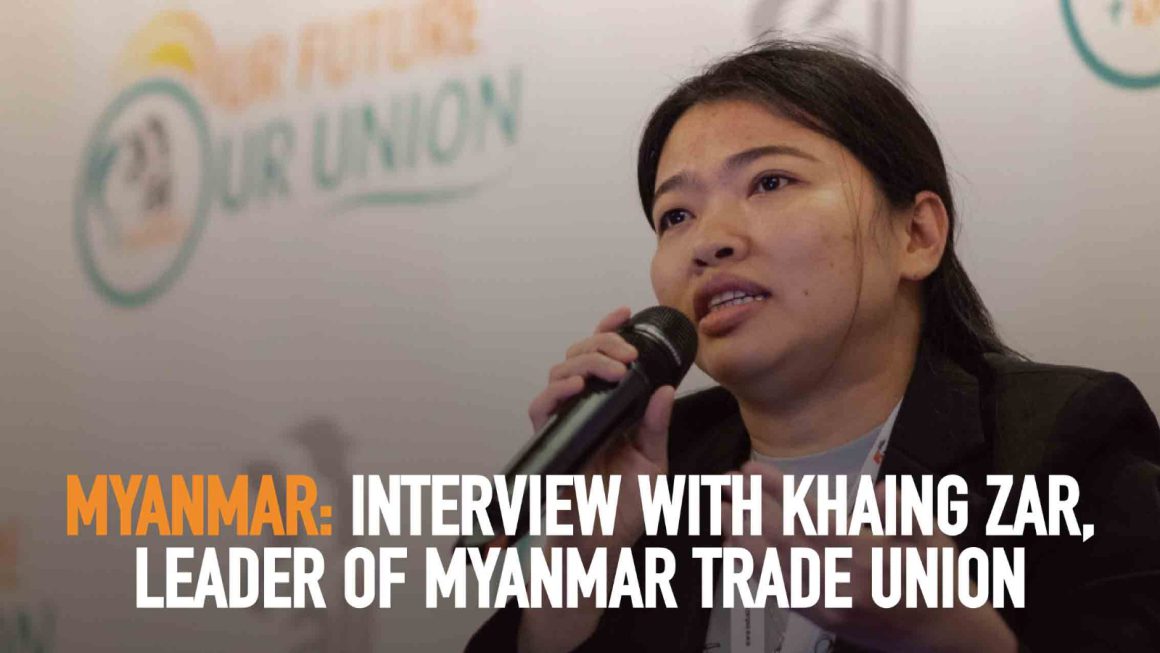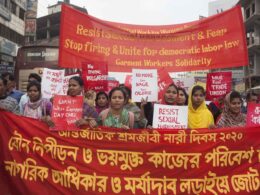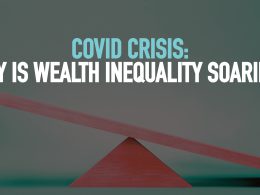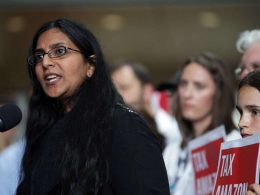Workers across the world have been inspired by the determined resistance in Myanmar to the military takeover and widespread repression that has followed. The working class has played a central role. International Socialist Alternative discussed the situation with Khaing Zar, a leader of the textile workers union and national treasurer of the Confederation of Trade Unions of Myanmar.
ISA: Thank you for taking the time to talk with us. We were particularly inspired when the coup took place because it was workers, medical workers, textile workers who were very active in coming out against the coup, in setting up the Civil Disobedience Movement (CDM) and so on. Could you explain how that happened, about the role of your union for example?
Khaing Zar: Yes, as a trade union we immediately had an executive committee meeting, that’s our central body to decide how to respond to the coup. We took the decision not to work with the military. We issued a statement to explain that, and organised for our members to join the demonstrations against the military coup.
ISA: As you know there was a big protest movement in Belarus last year. The workers were very active in opposing the regime, but they were not independently organised. But in your case, there was independent organisation by the working class, by the medical workers and by yourselves?
Khaing Zar: Yes, of course, we have our own organisation. Our members wanted to know what to do and were waiting for our decision. So, on the second of February, the day after the coup, they were ready to act.
ISA: Last week the schools were due to return to study, but it is reported that many students are boycotting them. Is that so, and if so why?
Khaing Zar: Yes, when you talk about the students, the high school students, they don’t want to attend because of the military rule. But at one school there was a bombing, two youth were wounded, so that created a situation where parents are worried about their children. So for the children at kindergarten or middle school who don’t understand the politics, they don’t go because their parents are worried about them.
ISA: Our understanding now is that there is a really bad economic situation in the country caused by the coup and made worse by Covid. What is the situation for the working class and for your members in particular in the textile industry?
Khaing Zar: After the military coup, nearly 200,000 garment workers and 500,000 construction workers have lost their jobs. Many of our members are losing their jobs, especially leaders of the trade union. As they have been taking part in the demonstrations, they are now being hounded by the military. Many of our members, many trade union leaders have had to go into hiding. So they are losing their jobs. But it is not just our members. Hundreds of thousands of others are losing their jobs because on the 14 March big industrial zones such as Hlaing Thar Yar and Shwepyitha were attacked by the military, forcing many, mainly Chinese plants to close. This was because there had been big demonstrations in these zones and the military crushed down brutally. This has left 150,000 workers jobless from just one zone. After that, the military declared martial law for both zones. The workers are just left to return to their villages, they cannot return to work because of these attacks, and because transport to these zones has stopped. Factories opened back up after one week, but still workers cannot come back.
ISA: You have mentioned a couple of times the CDM. Is the CDM still playing a central role in the struggle, and if so, how is it doing that?
Khaing Zar: Yes, the workers are still behind the CDM, they are not going back to work to support the military regime. This is because we, the Myanmar people have very bad experiences of military rule. I am sure you know that Myanmar was under military rule for many decades. Our education system was destroyed, there was child and forced labour used. There was no freedom of association. There were no worker rights or human rights. There were many cases when children were taken from their families as forced labour. That was a very bitter and difficult situation. So, there is no way we want to go back under military rule. That is why we have to oppose this new military coup.
ISA: We understand the problems with military rule, however the NLD government was not particularly worker-friendly. Nor did it have a good relationship with the national minorities, particularly the Rohingyas of course. How do you view the NLD, and National Unity Government — will they defend workers’ rights?
Khaing Zar: We are like trade unions around the world — we do not usually get support from governments. I don’t see people in the new government proposed by NLD that know anything about international law, they don’t know about trade unions because most of the NLD members now in position were in jail during military rule. We need time to educate those responsible for workers’ issues whether in the party or in government. We need time. That time will be possible only when we have better conditions.
ISA: We noticed in the election that the military have now annulled, there were a few worker/trade union candidates. What did they do and is there not a role for a worker/trade union participation in elections?
Khaing Zar: We did have some candidates, although of course we lost. In most cases the NLD won. Of course, most people wanted the NLD to win but we do need people who understand workers’ rights, and who will defend workers in the Parliament. We saw no-one in the previous government who understood workers’ issues, but we wanted to be represented in Parliament. That’s why some of our members ran in the election. We did this without any coordination with NLD.
ISA: Can we come back though to another issue? You spoke about the need for trade union activists in Myanmar to have contact internationally so that the International bodies can push the issue at the ILO and other bodies. Our experience is that the most effective workers’ solidarity is when there is direct contact between the workers in the workplaces. For example, there is a big problem with the textile industry — H&M is a major customer. H&M originally suspended their contract but have now started to buy again. There are, or have been recently strikes taking place in H&M in Spain, Chile, New Zealand, and I think in Belgium. Direct contact at rank and file level is always useful as they pressurise management or by boycotting the use of goods. There is also the question of oil and gas, those workers are organised. If they were to understand the need, they could boycott the supplies of oil and gas from Myanmar. That would seriously undermine the regime — have you had any discussions along those lines?
Khaing Zar: Well, the International Labour Conference (ILC) is just about to begin where we will be challenging the credentials of the Myanmar military. Before the start of the conference, we have had a meeting with the International Trade Union Confederation (ITUC) to ask them to support our call at the ILC, and instead to recognise the National Unity Government. All the international trade unions agree with us, support us. At the ILC the workers group support our call. Both the military and the NUG have sent delegations to the ILC and both have applied to the credentials committee. So it is now up to the ILO whether they will be accepted. It is now up to the credentials committee to decide.
Recently there was a decision by the World Health Organisation to exclude Myanmar from their annual meeting as they couldn’t decide who was the legitimate representative. We don’t want the same thing to happen with the ILC. We need the ILO to reject the military regime and to recognise the NUG — we are still working on it. I would ask you to work on the ILO issue too.
Regarding the companies, as President of the Industrial Workers Federation of Myanmar, I am working with those Brands that are active in Myanmar. I was shocked when they made the announcement that they were renewing the placing of orders. Before this announcement, we were negotiating with them to get an agreement to protect workers who are losing jobs because of the military attacks, and we are now finalising that agreement to protect workers, particularly to stress that they should not be discriminated against because of the security issue. Currently, if workers cannot go back to work, after three or five days they can be dismissed without compensation. We are arguing that workers cannot be dismissed without compensation — that will be applied after our agreement.
I am very worried about those workers who have not been able to work, who have lost their jobs. That is why we have been engaging with the Brands, but now I see they are resuming their orders in Myanmar. I do not agree with that.
As far as the oil and gas companies are concerned, we are calling for comprehensive sanctions, especially for the oil and gas companies, and insurance companies. We are focusing on these sectors because oil and gas gives a lot of money to the military, and that needs to stop immediately. Another issue is insurance: we are now asking the insurance companies to stop investing in Myanmar, as without insurance no business can operate. That is very important, and we are now working on it.
ISA: You have a lever on the brands that is currently not being used — the board of directors are only interested in profit, but the workers in the brands have a direct interest. We should campaign amongst them to support your struggle.
Khaing Zar: Yes, I definitely agree.
ISA: We have seen that women have been at the forefront of the opposition to the coup. We have seen how they have been active on the streets, but also how they have been subject to horrific sexual violence after their arrests. The role of women has been really inspiring. ISA and Rosa International have been involved in spreading information about the repression and the sexual violence against women in the movement. How do you see the situation with womens’ rights in Myanmar now?
Khaing Zar: Well, I see that many women are leading the revolution from their own position. I see that in the trade union movement and NGOs, (not only in my own trade union) many women are leading the activities. But as you say, the sexual harassment of women is widespread — as seen by what happened to leader of the ‘Solidarity of Trade Unions in Myanmar’ Daw Myo Aye, who has been arrested. Now I hear she is not very well, so she needs treatment. But what I see now is that men and women are working, struggling together. Women are not left behind in the movement.
ISA: We saw the figure that 60% of the protesters in Myanmar are women?
Khaing Zar: Yes, I think so.
ISA: We would be interested to know a bit more about the role of your trade union — we understand that legally trade unions are new, which makes it even more impressive that they play an important role. The role of the garment workers too has been very impressive. How did your union develop?
Khaing Zar: At the moment, we are trying to do our best to support workers who are supporting the CDM. They are losing their salaries, their homes. There are many in a difficult situation. So through the international unions we are collecting whatever money we can. Whenever we get support from the International community, we send support to the workers. And we are doing whatever we can inside the country.
Some of our leaders are having to move to the liberated areas where the National Defence Force (NDF) has built up a base. Where our members are organizing, taking part in demonstrations with others, with other political groups. We are trying to organize workers in different sectors and to link them up with international organisations, so that we can get what help we can. So to finish I would like to ask for your help, for your leaders to put pressure on your governments not to recognize the military junta at the ILC. We really need all the international organizations starting with the UN refuse to recognize this government, to force it out.
ISA: You spoke about how bad the military regime was in the past. Unfortunately, it called itself the Burmese socialist Buddhist party. And, of course, ISA is a socialist organization. How do you view socialism now?
Khaing Zar: For me as a trade unionist, I like social democratic ideology and of course, in the past many parties used socialist and cooperative ideas. I think the ideas are not bad, but the implementation was incorrect. They have been corrupted so people don’t trust the system. People don’t see it as a problem with a party, but with the system. As a trade union we have plans to educate our members, to teach them the different ideologies. We have of course been very busy so have not been able to do so yet, but amongst the leadership we have discussed plans. In 2012, we were planning ideological training for our leading members. We think this is very important. There is a lot of talk in Myanmar about democracy, but people do not really understand what democracy is. We need a lot of political education.
ISA: Is there anything you would like to say?
Khaing Zar: If we can communicate more, I can share more information. As far as the Brands are concerned, we now have a safe place from where to organize. There are many violations; it is very difficult to make sure workers’ rights are respected. But I do think the supply chains are important, for companies like H&M. Primark, Adidas. As there are issues such as security issue like bomb blasts, searching, arresting, abduction and robbing in industrial zones, the brands need to engage with their suppliers to make sure their suppliers and factories respect workers’ rights fully and do not terminate any workers for the absence from work for security reasons and communication difficulties.
We are continuing to fight back against the terrorist military regime. We cannot win this fight alone. We need international support. Then I believe we will win.












